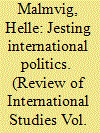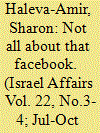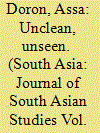|
|
|
Sort Order |
|
|
|
Items / Page
|
|
|
|
|
|
|
| Srl | Item |
| 1 |
ID:
123061


|
|
|
|
|
| Publication |
2013.
|
| Summary/Abstract |
Lenin allegedly referred to the thinkers and activists ready to cover up for his crimes against his own people as "useful idiots." Today, some intellectuals sacrifice their integrity as intellectuals not for a professedly progressive egalitarian movement, but in order to protect radical Islam, one of the most regressive and authoritarian movements imaginable. This article refers to such people as "useful infidels," showing how their excessive self-criticism is exploited by Islamists to incriminate the West in the evils of modernity. The result is a perversion of human rights discourse and a marriage of pre-modern sadism and post-modern masochism.
|
|
|
|
|
|
|
|
|
|
|
|
|
|
|
|
| 2 |
ID:
124922


|
|
|
|
|
| Publication |
2013.
|
| Summary/Abstract |
Lenin allegedly referred to the thinkers and activists ready to cover up for his crimes against his own people as "useful idiots." Today, some intellectuals sacrifice their integrity as intellectuals not for a professedly progressive egalitarian movement, but in order to protect radical Islam, one of the most regressive and authoritarian movements imaginable. This article refers to such people as "useful infidels," showing how their excessive self-criticism is exploited by Islamists to incriminate the West in the evils of modernity. The result is a perversion of human rights discourse and a marriage of pre-modern sadism and post-modern masochism.
|
|
|
|
|
|
|
|
|
|
|
|
|
|
|
|
| 3 |
ID:
182980


|
|
|
|
|
| Summary/Abstract |
This article examines a humorous meme that emerged on Chinese TikTok during the COVID-19 pandemic in China. Using #workfromhomewithchildcare, Chinese working mothers shared humorous clips of their experience of working from home with their children who were also at home during the pandemic lockdown. By analysing the themes, protagonists, and humour techniques of a sample of 85 videos, we ask why the mood of these clips is so strongly marked by humour, and what this tells us about contemporary Chinese society, particularly about the position of women and mothers. We show that these memetic clips consist of three distinct genres of mothers working from home: (1) ‘balancing mothers’ who balance between work and childcare, (2) ‘pedagogic mothers’ who give childcare tips, and (3) ‘commercially oriented’ mothers who offer tutorials by means of product placement and advertisement. While these memes express what Mary Douglas called ‘a joke in the social structure’ without offering either relief or critique, they do create an online joking culture that offers temporary relief as well as awareness that others are in the same position. Our analysis tempers enthusiastic claims about both the critical potential of humour and the new ‘liberating’ affordances offered by digital platforms to produce liberating female spaces.
|
|
|
|
|
|
|
|
|
|
|
|
|
|
|
|
| 4 |
ID:
192319


|
|
|
|
|
| Summary/Abstract |
Humour has recently emerged as an important research topic in International Politics. Scholars have investigated how states and state leaders practice humour as part of their diplomatic exchanges, in misinformation campaigns, and nation-branding. Important knowledge has been gained as to how humorous practices partake in constituting identities, managing recognition, and international anxieties or contesting global orders. Yet, little attention has been devoted to interrogating the risk that humorous practices may give rise to in international politics, to the underside of humour's productive power. This article aims to begin unpacking these risks both theoretically and empirically. To do so, it engages with the critical thinking on humour by Kierkegaard and Foster Wallace in particular, suggesting three challenging implications: (1) humorous entrapments; (2) facile forms of detached engagement; and (3) ambiguous blurring of fiction and reality. It then shows how these unfold empirically in: Iran's meme war with the US, a Yes Men's parody during COP15, and the Pyongyang Nuclear Summit, developing a three-pronged analytical strategy for studying humorous practices and their different relations to formations of power/knowledge.
|
|
|
|
|
|
|
|
|
|
|
|
|
|
|
|
| 5 |
ID:
149191


|
|
|
|
|
| Summary/Abstract |
Only 26 months separate the elections for the 19th Knesset (January 2013) from those for the 20th (March 2015), yet the digital campaigns employed in the latter demonstrate interesting shifts. Using empirical data collected from social network sites and from journalistic campaign coverage, this article analyses the use of the online sphere by parties, candidates and audiences, identifying evolving shifts in digital campaigning. The findings point out the reoccurrence of some trends, whether intensified or otherwise, as well as the emergence of new trends that illustrate the evolution of Israeli online campaigning. The prominent recurring trends are (1) personal politics; (2) professionalized campaigns; (3) alternative funding models; (4) social activism; and (5) constant violation of election law provisions. The new trends include: (1) Facebook’s alternatives; and (2) assimilation of web culture into the campaigns. Analysing the findings suggests that current campaigns focus on entertainment rather than on real discourse and stress the obsolescence of the current legal regime
|
|
|
|
|
|
|
|
|
|
|
|
|
|
|
|
| 6 |
ID:
187115


|
|
|
|
|
| Summary/Abstract |
Focusing on the case of ‘Gay Clown Putin’, this article theorizes memes as visual interventions in international politics. While not all memes are political interventions, Gay Clown Putin is an iconic meme that is part of the international response to Russian state-directed political homophobia that emerged after the gay propaganda law was passed in 2013. How it has circulated and the attention it has received make it apt for exploring memes as visual political interventions that challenge national security discourses. Here, I provide three readings of Gay Clown Putin that suggest different possibilities for how the meme might work politically. In so doing, I deepen international relations’ engagement with queer theory by bringing in the politics of play that works through a queer epistemology that embraces deviance. Bringing memes to the study of international security, I show how the collection of images making up the Gay Clown Putin meme provides space for understanding the visual politics of security.
|
|
|
|
|
|
|
|
|
|
|
|
|
|
|
|
| 7 |
ID:
149778


|
|
|
|
|
| Summary/Abstract |
Successive Indian governments have attempted to tackle the formidable task of creating a clean India, with varied results. With the country's rapidly growing middle class eager to participate in a sanitised global consumer capitalism, many Indians are becoming frustrated with the ‘unruly’ nature of their urban landscape, its dirty streets and public spaces. This is particularly discernible amongst India's middle-class youth, who seem impatient with the state's apparent inability to manage waste and disorder, and it is clear that several civil society campaigns designed to promote a clean India explicitly target Indian youth. In this paper, I explore what the ideological premise of cleansing initiatives reveals about the aspirations, needs and anxieties of India's youth.
|
|
|
|
|
|
|
|
|
|
|
|
|
|
|
|
|
|
|
|
|